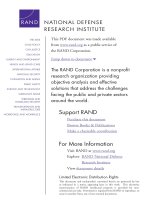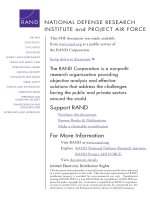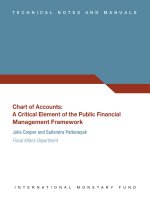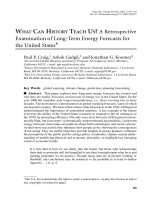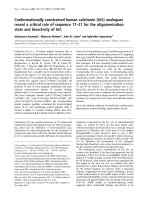A Critical Examination Of The Position Of Mr. Darwin''''s Work ppt
Bạn đang xem bản rút gọn của tài liệu. Xem và tải ngay bản đầy đủ của tài liệu tại đây (248.93 KB, 87 trang )
The Project Gutenberg EBook of A Critical
Examination Of The Position Of
Mr. Darwin's Work, "On The Origin Of
Species," In Relation To The Complete
Theory Of The Causes Of The Phenomena Of
Organic Nature, by Thomas H. Huxley
This eBook is for the use of anyone
anywhere at no cost and with
almost no restrictions whatsoever. You may
copy it, give it away or
re-use it under the terms of the Project
Gutenberg License included
with this eBook or online at
www.gutenberg.org
Title: A Critical Examination Of The
Position Of Mr. Darwin's Work, "On The
Origin Of Species," In Relation To The
Complete Theory Of The Causes Of The
Phenomena Of Organic Nature
Lecture VI. (of VI.), Lectures To Working
Men, at the
Museum of Practical Geology, 1863, On
Darwin's work: "Origin
of Species"
Author: Thomas H. Huxley
Release Date: January 4, 2009 [EBook
#2926]
Language: English
*** START OF THIS PROJECT GUTENBERG EBOOK
ON THE ORIGIN OF SPECIES ***
Produced by Amy E. Zelmer, and David
Widger
A CRITICAL
EXAMINATION
OF THE
POSITION
OF MR.
DARWIN'S
WORK,
"ON THE
ORIGIN OF
SPECIES,"
IN RELATION TO
THE COMPLETE
THEORY OF THE
CAUSES OF THE
PHENOMENA OF
ORGANIC NATURE
Lecture VI. (of VI.),
"Lectures To Working Men",
at the Museum of Practical
Geology, 1863, On Darwin's
work: "Origin of Species".
By Thomas H. Huxley
IN the preceding five lectures I have
endeavoured to give you an account of
those facts, and of those reasonings from
facts, which form the data upon which all
theories regarding the causes of the
phenomena of organic nature must be
based. And, although I have had frequent
occasion to quote Mr. Darwin—as all
persons hereafter, in speaking upon these
subjects, will have occasion to quote his
famous book on the "Origin of
Species,"—you must yet remember that,
wherever I have quoted him, it has not
been upon theoretical points, or for
statements in any way connected with his
particular speculations, but on matters of
fact, brought forward by himself, or
collected by himself, and which appear
incidentally in his book. If a man 'will'
make a book, professing to discuss a
single question, an encyclopaedia, I
cannot help it.
Now, having had an opportunity of
considering in this sort of way the
different statements bearing upon all
theories whatsoever, I have to lay before
you, as fairly as I can, what is Mr.
Darwin's view of the matter and what
position his theories hold, when judged by
the principles which I have previously
laid down, as deciding our judgments
upon all theories and hypotheses.
I have already stated to you that the
inquiry respecting the causes of the
phenomena of organic nature resolves
itself into two problems—the first being
the question of the origination of living or
organic beings; and the second being the
totally distinct problem of the
modification and perpetuation of organic
beings when they have already come into
existence. The first question Mr. Darwin
does not touch; he does not deal with it at
all; but he says—given the origin of
organic matter—supposing its creation to
have already taken place, my object is to
show in consequence of what laws and
what demonstrable properties of organic
matter, and of its environments, such states
of organic nature as those with which we
are acquainted must have come about.
This, you will observe, is a perfectly
legitimate proposition; every person has a
right to define the limits of the inquiry
which he sets before himself; and yet it is
a most singular thing that in all the
multifarious, and, not unfrequently,
ignorant attacks which have been made
upon the 'Origin of Species', there is
nothing which has been more speciously
criticised than this particular limitation. If
people have nothing else to urge against
the book, they say—"Well, after all, you
see, Mr. Darwin's explanation of the
'Origin of Species' is not good for much,
because, in the long run, he admits that he
does not know how organic matter began
to exist. But if you admit any special
creation for the first particle of organic
matter you may just as well admit it for all
the rest; five hundred or five thousand
distinct creations are just as intelligible,
and just as little difficult to understand, as
one." The answer to these cavils is two-
fold. In the first place, all human inquiry
must stop somewhere; all our knowledge
and all our investigation cannot take us
beyond the limits set by the finite and
restricted character of our faculties, or
destroy the endless unknown, which
accompanies, like its shadow, the endless
procession of phenomena. So far as I can
venture to offer an opinion on such a
matter, the purpose of our being in
existence, the highest object that human
beings can set before themselves, is not
the pursuit of any such chimera as the
annihilation of the unknown; but it is
simply the unwearied endeavour to
remove its boundaries a little further from
our little sphere of action.
I wonder if any historian would for a
moment admit the objection, that it is
preposterous to trouble ourselves about
the history of the Roman Empire, because
we do not know anything positive about
the origin and first building of the city of
Rome! Would it be a fair objection to
urge, respecting the sublime discoveries
of a Newton, or a Kepler, those great
philosophers, whose discoveries have
been of the profoundest benefit and
service to all men,—to say to them
—"After all that you have told us as to
how the planets revolve, and how they are
maintained in their orbits, you cannot tell
us what is the cause of the origin of the
sun, moon, and stars. So what is the use of
what you have done?" Yet these
objections would not be one whit more
preposterous than the objections which
have been made to the 'Origin of Species.'
Mr. Darwin, then, had a perfect right to
limit his inquiry as he pleased, and the
only question for us—the inquiry being so
limited—is to ascertain whether the
method of his inquiry is sound or unsound;
whether he has obeyed the canons which
must guide and govern all investigation, or
whether he has broken them; and it was
because our inquiry this evening is
essentially limited to that question, that I
spent a good deal of time in a former
lecture (which, perhaps, some of you
thought might have been better employed),
in endeavouring to illustrate the method
and nature of scientific inquiry in general.
We shall now have to put in practice the
principles that I then laid down.
I stated to you in substance, if not in
words, that wherever there are complex
masses of phenomena to be inquired into,
whether they be phenomena of the affairs
of daily life, or whether they belong to the
more abstruse and difficult problems laid
before the philosopher, our course of
proceeding in unravelling that complex
chain of phenomena with a view to get at
its cause, is always the same; in all cases
we must invent an hypothesis; we must
place before ourselves some more or less
likely supposition respecting that cause;
and then, having assumed an hypothesis,
having supposed cause for the phenomena
in question, we must endeavour, on the
one hand, to demonstrate our hypothesis,
or, on the other, to upset and reject it
altogether, by testing it in three ways. We
must, in the first place, be prepared to
prove that the supposed causes of the
phenomena exist in nature; that they are
what the logicians call 'vera causae'—true
causes;—in the next place, we should be
prepared to show that the assumed causes
of the phenomena are competent to
produce such phenomena as those which
we wish to explain by them; and in the last
place, we ought to be able to show that no
other known causes are competent to
produce those phenomena. If we can
succeed in satisfying these three
conditions we shall have demonstrated
our hypothesis; or rather I ought to say we
shall have proved it as far as certainty is
possible for us; for, after all, there is no
one of our surest convictions which may
not be upset, or at any rate modified by a
further accession of knowledge. It was
because it satisfied these conditions that
we accepted the hypothesis as to the
disappearance of the tea-pot and spoons in
the case I supposed in a previous lecture;
we found that our hypothesis on that
subject was tenable and valid, because the
supposed cause existed in nature, because
it was competent to account for the
phenomena, and because no other known
cause was competent to account for them;
and it is upon similar grounds that any
hypothesis you choose to name is accepted
in science as tenable and valid.
What is Mr. Darwin's hypothesis? As I
apprehend it—for I have put it into a
shape more convenient for common
purposes than I could find 'verbatim' in his
book—as I apprehend it, I say, it is, that
all the phenomena of organic nature, past
and present, result from, or are caused by,
the inter-action of those properties of
organic matter, which we have called
ATAVISM and VARIABILITY, with the
CONDITIONS OF EXISTENCE; or, in
other words,—given the existence of
organic matter, its tendency to transmit its
properties, and its tendency occasionally
to vary; and, lastly, given the conditions of
existence by which organic matter is
surrounded—that these put together are the
causes of the Present and of the Past
conditions of ORGANIC NATURE.
Such is the hypothesis as I understand
it. Now let us see how it will stand the
various tests which I laid down just now.
In the first place, do these supposed
causes of the phenomena exist in nature?
Is it the fact that in nature these properties
of organic matter—atavism and variability
—and those phenomena which we have
called the conditions of existence,—is it
true that they exist? Well, of course, if
they do not exist, all that I have told you in
the last three or four lectures must be
incorrect, because I have been attempting
to prove that they do exist, and I take it
that there is abundant evidence that they
do exist; so far, therefore, the hypothesis
does not break down.
But in the next place comes a much
more difficult inquiry:—Are the causes
indicated competent to give rise to the
phenomena of organic nature? I suspect
that this is indubitable to a certain extent.
It is demonstrable, I think, as I have
endeavoured to show you, that they are
perfectly competent to give rise to all the
phenomena which are exhibited by
RACES in nature. Furthermore, I believe
that they are quite competent to account
for all that we may call purely structural
phenomena which are exhibited by
SPECIES in nature. On that point also I
have already enlarged somewhat. Again, I
think that the causes assumed are
competent to account for most of the
physiological characteristics of species,
and I not only think that they are competent
to account for them, but I think that they
account for many things which otherwise
remain wholly unaccountable and
inexplicable, and I may say
incomprehensible. For a full exposition of
the grounds on which this conviction is
based, I must refer you to Mr. Darwin's
work; all that I can do now is to illustrate
what I have said by two or three cases
taken almost at random.
I drew your attention, on a previous
evening, to the facts which are embodied
in our systems of Classification, which are
the results of the examination and
comparison of the different members of
the animal kingdom one with another. I
mentioned that the whole of the animal
kingdom is divisible into five sub-
kingdoms; that each of these sub-kingdoms
is again divisible into provinces; that each
province may be divided into classes, and
the classes into the successively smaller
groups, orders, families, genera, and
species.
Now, in each of these groups, the
resemblance in structure among the
members of the group is closer in
proportion as the group is smaller. Thus, a
man and a worm are members of the
animal kingdom in virtue of certain
apparently slight though really
fundamental resemblances which they
present. But a man and a fish are members
of the same sub-kingdom 'Vertebrata',
because they are much more like one
another than either of them is to a worm,
or a snail, or any member of the other sub-
kingdoms. For similar reasons men and
horses are arranged as members of the
same Class, 'Mammalia'; men and apes as
members of the same Order, 'Primates';
and if there were any animals more like
men than they were like any of the apes,
and yet different from men in important
and constant particulars of their
organization, we should rank them as
members of the same Family, or of the
same Genus, but as of distinct Species.
That it is possible to arrange all the
varied forms of animals into groups,
having this sort of singular subordination
one to the other, is a very remarkable
circumstance; but, as Mr. Darwin remarks,
this is a result which is quite to be
expected, if the principles which he lays
down be correct. Take the case of the
races which are known to be produced by
the operation of atavism and variability,
and the conditions of existence which
check and modify these tendencies. Take
the case of the pigeons that I brought
before you; there it was shown that they
might be all classed as belonging to some
one of five principal divisions, and that
within these divisions other subordinate
groups might be formed. The members of
these groups are related to one another in
just the same way as the genera of a
family, and the groups themselves as the
families of an order, or the orders of a
class; while all have the same sort of
structural relations with the wild rock-
pigeon, as the members of any great
natural group have with a real or
imaginary typical form. Now, we know
that all varieties of pigeons of every kind
have arisen by a process of selective
breeding from a common stock, the rock-
pigeon; hence, you see, that if all species
of animals have proceeded from some
common stock, the general character of
their structural relations, and of our
systems of classification, which express
those relations, would be just what we
find them to be. In other words, the
hypothetical cause is, so far, competent to

